Unit 1 How can we become good learners. Section B 2a-2e 课件2022-2023学年人教版九年级英语全册
文档属性
| 名称 | Unit 1 How can we become good learners. Section B 2a-2e 课件2022-2023学年人教版九年级英语全册 | 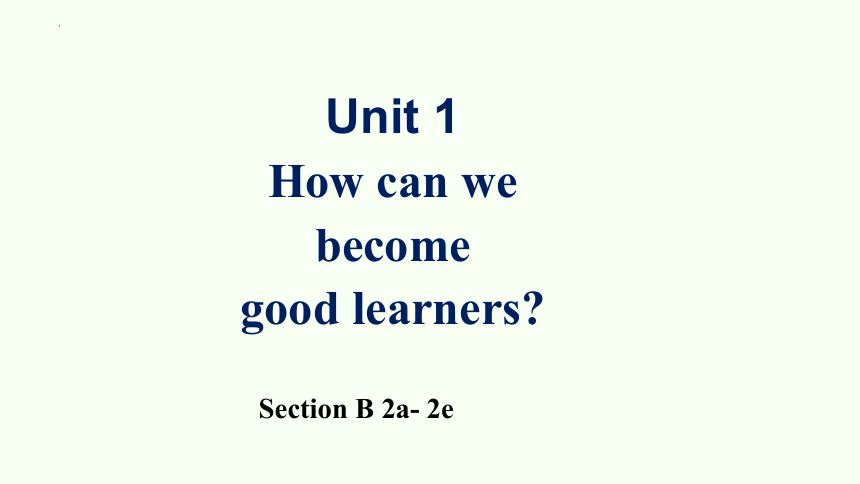 | |
| 格式 | pptx | ||
| 文件大小 | 2.7MB | ||
| 资源类型 | 教案 | ||
| 版本资源 | 人教新目标(Go for it)版 | ||
| 科目 | 英语 | ||
| 更新时间 | 2023-07-22 17:05:26 | ||
图片预览

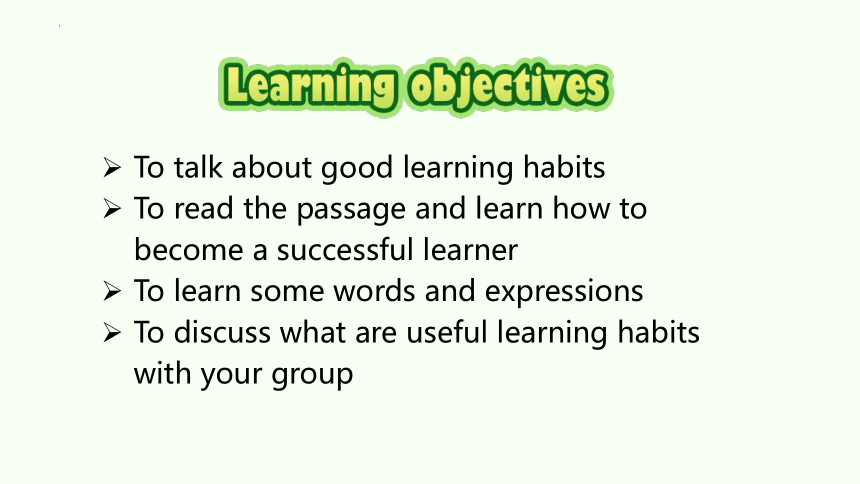
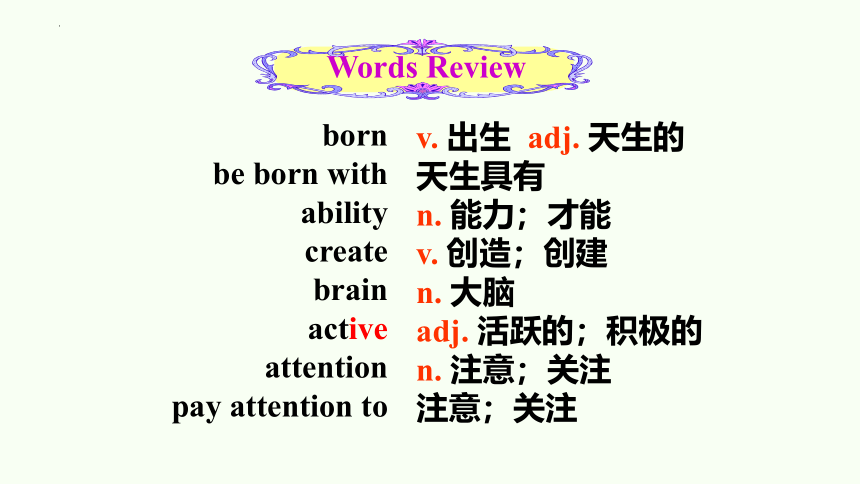
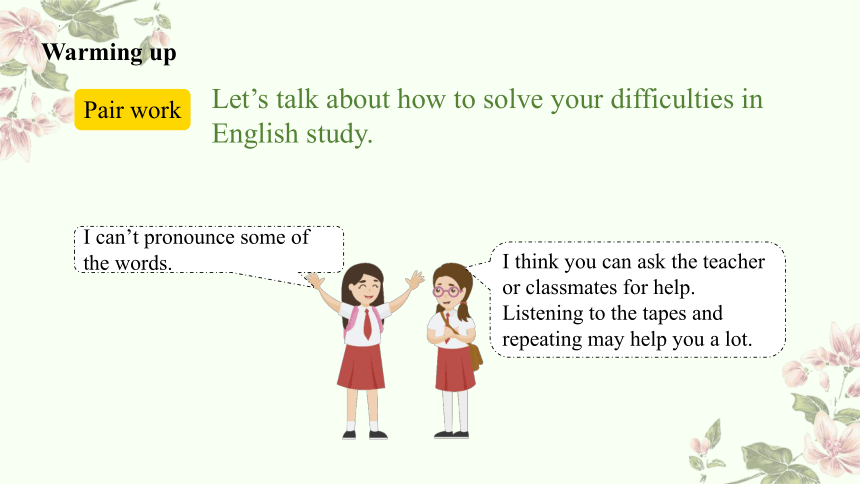
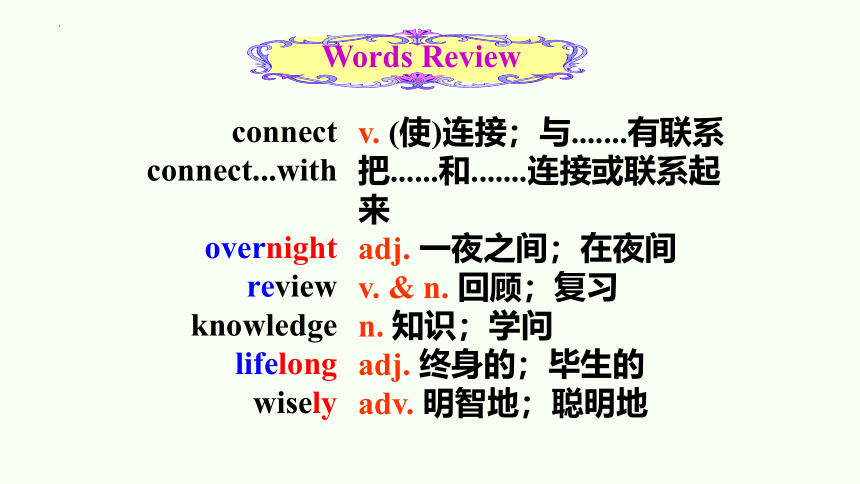
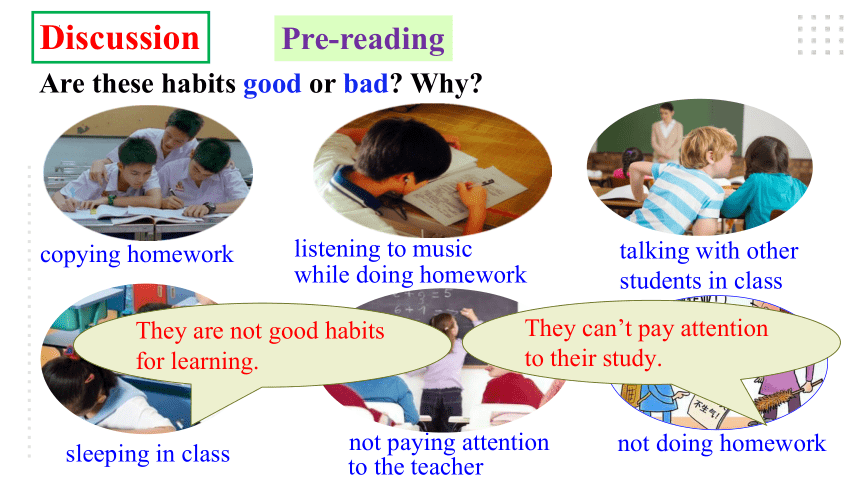
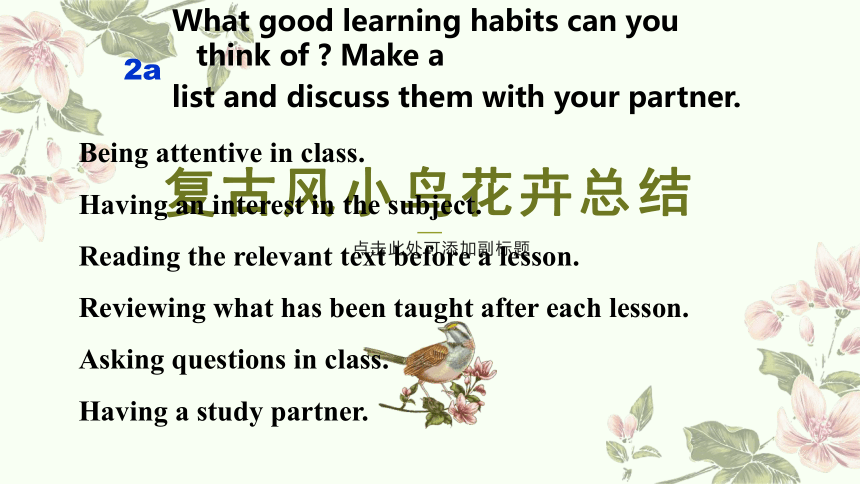
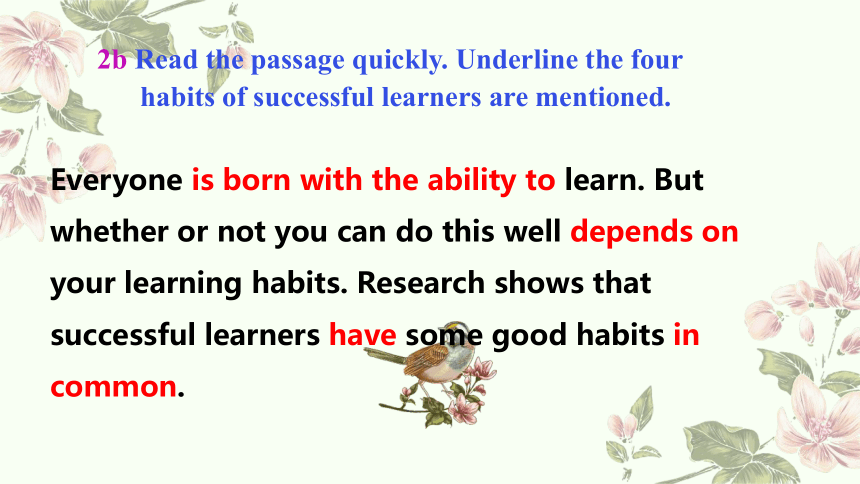
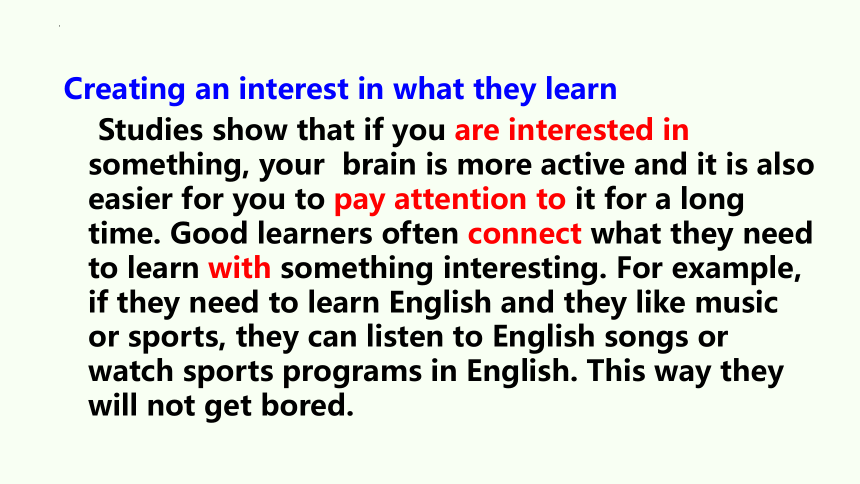
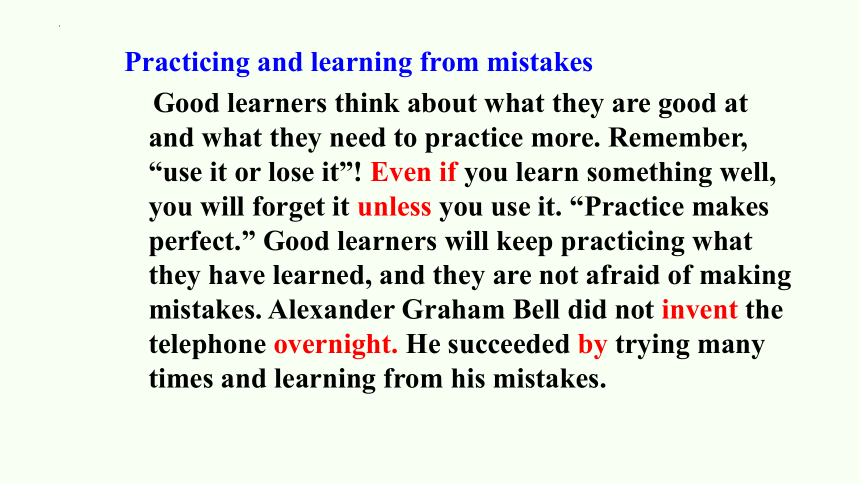
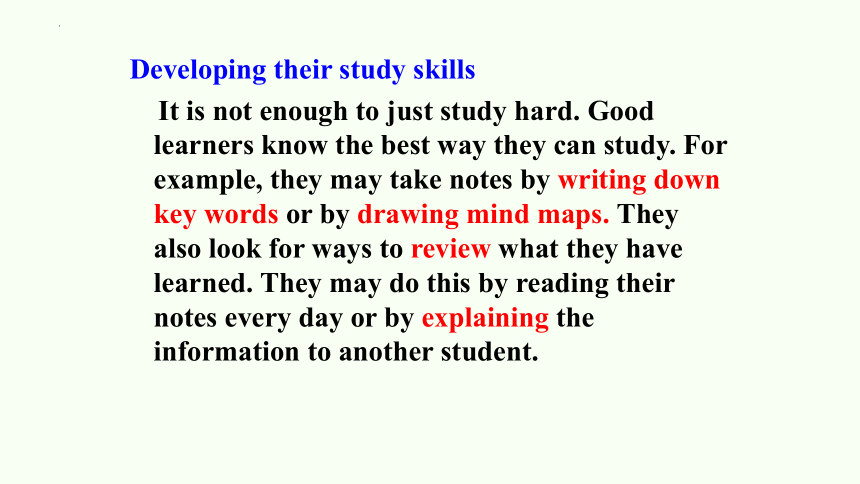
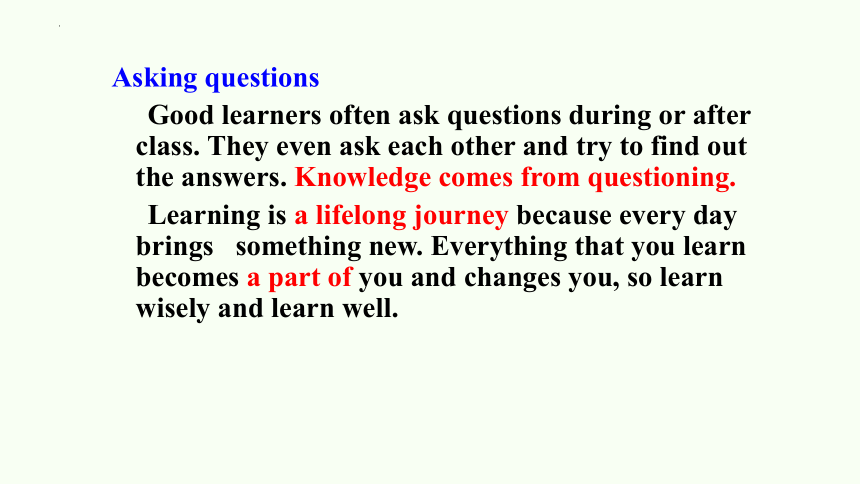
文档简介
(共31张PPT)
Unit 1
How can we
become
good learners
Section B 2a- 2e
To talk about good learning habits
To read the passage and learn how to become a successful learner
To learn some words and expressions
To discuss what are useful learning habits with your group
born
be born with
ability
create
brain
active
attention
pay attention to
v. 出生 adj. 天生的
天生具有
n. 能力;才能
v. 创造;创建
n. 大脑
adj. 活跃的;积极的
n. 注意;关注
注意;关注
Words Review
Warming up
Pair work
Let’s talk about how to solve your difficulties in English study.
I think you can ask the teacher or classmates for help. Listening to the tapes and repeating may help you a lot.
I can’t pronounce some of the words.
connect
connect...with
overnight
review
knowledge
lifelong
wisely
v. (使)连接;与.......有联系
把......和.......连接或联系起来
adj. 一夜之间;在夜间
v. & n. 回顾;复习
n. 知识;学问
adj. 终身的;毕生的
adv. 明智地;聪明地
Words Review
Presentation
Discussion
Pre-reading
Are these habits good or bad Why
listening to music
while doing homework
copying homework
talking with other
students in class
sleeping in class
not paying attention
to the teacher
not doing homework
They are not good habits for learning.
They can’t pay attention to their study.
复古风小鸟花卉总结
点击此处可添加副标题
What good learning habits can you think of Make a
list and discuss them with your partner.
2a
Being attentive in class.
Having an interest in the subject.
Reading the relevant text before a lesson.
Reviewing what has been taught after each lesson.
Asking questions in class.
Having a study partner.
Everyone is born with the ability to learn. But whether or not you can do this well depends on your learning habits. Research shows that successful learners have some good habits in common.
2b Read the passage quickly. Underline the four
habits of successful learners are mentioned.
Creating an interest in what they learn
Studies show that if you are interested in something, your brain is more active and it is also easier for you to pay attention to it for a long time. Good learners often connect what they need to learn with something interesting. For example, if they need to learn English and they like music or sports, they can listen to English songs or watch sports programs in English. This way they will not get bored.
Practicing and learning from mistakes
Good learners think about what they are good at and what they need to practice more. Remember, “use it or lose it”! Even if you learn something well, you will forget it unless you use it. “Practice makes perfect.” Good learners will keep practicing what they have learned, and they are not afraid of making mistakes. Alexander Graham Bell did not invent the telephone overnight. He succeeded by trying many times and learning from his mistakes.
Developing their study skills
It is not enough to just study hard. Good learners know the best way they can study. For example, they may take notes by writing down key words or by drawing mind maps. They also look for ways to review what they have learned. They may do this by reading their notes every day or by explaining the information to another student.
Asking questions
Good learners often ask questions during or after class. They even ask each other and try to find out the answers. Knowledge comes from questioning.
Learning is a lifelong journey because every day brings something new. Everything that you learn becomes a part of you and changes you, so learn wisely and learn well.
1.be born 意为“天生,出生”为被动语态, be 动词通常用was 或were,born 为bear 的过去式, 后可接时间或地点的介词短语。
E.g. I was born in a small village.
我出生在一个小山村。
2.ability 在此处为不可数名词,意为“能力”常构成短语 have the ability to do sth. ( 有能力做某事) 。
Man has the ability to speak.
人类有说话的能力。
3.depend on sb./ sth. 取决于某人、某物
depend on sb./ sth. to do sth.
指望某人/某物做某事
depend on + 从句 取决于…
4.whether or not you can do this well是
一个从句,作整个句子的主语。 whether or
not表示“是否”。使用时也可以把whether
和or not分开,or not 放到句尾。
I can’t tell whether or not the teacher likes me.
我不知道老师喜不喜欢我。
= I can’t tell whether the teacher likes me or not.
依据;依赖
5.have sth. in common (with sb./ sth.)
(与某人、某物有相同之处)
Jane and I have nothing in common.
我与简毫无共同之处之处。
6.pay attention to中to为介词,其后要接名词、代词或动词-ing。
eg:You should pay attention to your health.你应该注意你的健康。
You must pay attention to looking after your dog well when you are taking it for a
walk.当你遛狗的时候,你必须注意照看好你的狗。
7.be interested in sth./ doing sth.
对……很感兴趣
I’m not really interested in politics.
我对政治不是很感兴趣。
8.connect...to/with... 把……和……相连接;connect…with...还可表示“把......和……联系起来”;connect的名词形式是connection。
eg:You can connect the speaker to the CD player. 你可以把扬声器连接到激光唱机上。
What is the connection between the two ideas 这两个想法之间有何联系?
9.unless 连词,“ 除非,如果不” ,引导条件状语从句,含有否定意义,相当于if … not 。
I shall go to the supermarket unless it rains.
如果天气不下雨的话,我就去超市。
= I shall go to the supermarket if it doesn’t rain.
10. Even if you learn something well, you will forget it unless you use it.
even if引导让步状语从句,意为“即使/虽然”,等同于even though /although /though,可置于句首或主句后,不能与
but连用。
e.g. Even if it’s hard work, I enjoy it.
=Even though/Although/Though it’s hard
work, I enjoy it.
He will come on time even if it rains.
11.Think about 意为“考虑”其后接名词、代词、动词-ing形式或宾语从句。
They are thinking about a serious problem.
他们正在考虑一个严肃的问题。
12.knowledge常用作不可数名词。但有时可用a knowledge,
常与介词of或 about 连用,表示“……方面的知识”。
eg:Knowledge is power.
知识就是力量。
He has a wide knowledge of painting and music.
他在绘画和音乐方面知识渊博。
1. Does the writer think that everyone is born with the ability to learn well Do you agree Why or why not
2. Why is it a good idea to connect something you need to learn with something you are interested in
No, he doesn’t.
Yes, I do.
Because whether or not you can do this well depends on your learning habits.
Because if you are interested in something, your brain is more active and it is also easier for you to pay attention to it for a long time.
2c Read the passage again and answer the questions.
3. What do the sayings “use it or lose it” and “practice makes perfect” mean Do you agree with them
4. Do good learners learn from mistakes or are they afraid of making mistakes
1) Even if you learn something well, you will forget it unless you use it.
2) We should keep practicing what we have learned so that we can be good at it.
3) Yes, I do.
They learn from mistakes.
5. What study skills does the writer talk about Do you have those study skills
6. Do you agree that learning is a lifelong journey Why or why not
学习技能
Taking notes by writing down key words or by drawing mind maps, looking for ways to review what they have learned, and doing this by reading their notes every day or by explaining the information to another student.
Yes. Because every day brings something new.
Exercises
一、单选
1. You need to pay attention to ________ as much as possible.
A. speaking B. speak C. speaks D. spoken
2. The poor boy was born _______ a weak heart. We’re going to raise money for
him next week.
A. in B. by C. on D. with
3. A good student connects what he reads _____ what he sees around him.
A. for B. with C. in D. on
A
D
B
1. 注意,关注
2. 把……和……联系起来
3. 天生具有……
4. 取决于
5. 即使
6. 对……感兴趣
7. 有共同之处
8. 向……学习
9. 熟能生巧
pay attention to
connect…with…
be born with…
depend on
even if
be interested in
have sth. in common
learn from
Practice makes perfect.
Do you think you are a good learner What learning habits do you think are useful Discuss with your group and share your ideas with the class next time.
A: I think another way to become a successful learner is
by trying to think about the same thing in different
ways.
B: I agree. I believe that…
THANKS
Unit 1
How can we
become
good learners
Section B 2a- 2e
To talk about good learning habits
To read the passage and learn how to become a successful learner
To learn some words and expressions
To discuss what are useful learning habits with your group
born
be born with
ability
create
brain
active
attention
pay attention to
v. 出生 adj. 天生的
天生具有
n. 能力;才能
v. 创造;创建
n. 大脑
adj. 活跃的;积极的
n. 注意;关注
注意;关注
Words Review
Warming up
Pair work
Let’s talk about how to solve your difficulties in English study.
I think you can ask the teacher or classmates for help. Listening to the tapes and repeating may help you a lot.
I can’t pronounce some of the words.
connect
connect...with
overnight
review
knowledge
lifelong
wisely
v. (使)连接;与.......有联系
把......和.......连接或联系起来
adj. 一夜之间;在夜间
v. & n. 回顾;复习
n. 知识;学问
adj. 终身的;毕生的
adv. 明智地;聪明地
Words Review
Presentation
Discussion
Pre-reading
Are these habits good or bad Why
listening to music
while doing homework
copying homework
talking with other
students in class
sleeping in class
not paying attention
to the teacher
not doing homework
They are not good habits for learning.
They can’t pay attention to their study.
复古风小鸟花卉总结
点击此处可添加副标题
What good learning habits can you think of Make a
list and discuss them with your partner.
2a
Being attentive in class.
Having an interest in the subject.
Reading the relevant text before a lesson.
Reviewing what has been taught after each lesson.
Asking questions in class.
Having a study partner.
Everyone is born with the ability to learn. But whether or not you can do this well depends on your learning habits. Research shows that successful learners have some good habits in common.
2b Read the passage quickly. Underline the four
habits of successful learners are mentioned.
Creating an interest in what they learn
Studies show that if you are interested in something, your brain is more active and it is also easier for you to pay attention to it for a long time. Good learners often connect what they need to learn with something interesting. For example, if they need to learn English and they like music or sports, they can listen to English songs or watch sports programs in English. This way they will not get bored.
Practicing and learning from mistakes
Good learners think about what they are good at and what they need to practice more. Remember, “use it or lose it”! Even if you learn something well, you will forget it unless you use it. “Practice makes perfect.” Good learners will keep practicing what they have learned, and they are not afraid of making mistakes. Alexander Graham Bell did not invent the telephone overnight. He succeeded by trying many times and learning from his mistakes.
Developing their study skills
It is not enough to just study hard. Good learners know the best way they can study. For example, they may take notes by writing down key words or by drawing mind maps. They also look for ways to review what they have learned. They may do this by reading their notes every day or by explaining the information to another student.
Asking questions
Good learners often ask questions during or after class. They even ask each other and try to find out the answers. Knowledge comes from questioning.
Learning is a lifelong journey because every day brings something new. Everything that you learn becomes a part of you and changes you, so learn wisely and learn well.
1.be born 意为“天生,出生”为被动语态, be 动词通常用was 或were,born 为bear 的过去式, 后可接时间或地点的介词短语。
E.g. I was born in a small village.
我出生在一个小山村。
2.ability 在此处为不可数名词,意为“能力”常构成短语 have the ability to do sth. ( 有能力做某事) 。
Man has the ability to speak.
人类有说话的能力。
3.depend on sb./ sth. 取决于某人、某物
depend on sb./ sth. to do sth.
指望某人/某物做某事
depend on + 从句 取决于…
4.whether or not you can do this well是
一个从句,作整个句子的主语。 whether or
not表示“是否”。使用时也可以把whether
和or not分开,or not 放到句尾。
I can’t tell whether or not the teacher likes me.
我不知道老师喜不喜欢我。
= I can’t tell whether the teacher likes me or not.
依据;依赖
5.have sth. in common (with sb./ sth.)
(与某人、某物有相同之处)
Jane and I have nothing in common.
我与简毫无共同之处之处。
6.pay attention to中to为介词,其后要接名词、代词或动词-ing。
eg:You should pay attention to your health.你应该注意你的健康。
You must pay attention to looking after your dog well when you are taking it for a
walk.当你遛狗的时候,你必须注意照看好你的狗。
7.be interested in sth./ doing sth.
对……很感兴趣
I’m not really interested in politics.
我对政治不是很感兴趣。
8.connect...to/with... 把……和……相连接;connect…with...还可表示“把......和……联系起来”;connect的名词形式是connection。
eg:You can connect the speaker to the CD player. 你可以把扬声器连接到激光唱机上。
What is the connection between the two ideas 这两个想法之间有何联系?
9.unless 连词,“ 除非,如果不” ,引导条件状语从句,含有否定意义,相当于if … not 。
I shall go to the supermarket unless it rains.
如果天气不下雨的话,我就去超市。
= I shall go to the supermarket if it doesn’t rain.
10. Even if you learn something well, you will forget it unless you use it.
even if引导让步状语从句,意为“即使/虽然”,等同于even though /although /though,可置于句首或主句后,不能与
but连用。
e.g. Even if it’s hard work, I enjoy it.
=Even though/Although/Though it’s hard
work, I enjoy it.
He will come on time even if it rains.
11.Think about 意为“考虑”其后接名词、代词、动词-ing形式或宾语从句。
They are thinking about a serious problem.
他们正在考虑一个严肃的问题。
12.knowledge常用作不可数名词。但有时可用a knowledge,
常与介词of或 about 连用,表示“……方面的知识”。
eg:Knowledge is power.
知识就是力量。
He has a wide knowledge of painting and music.
他在绘画和音乐方面知识渊博。
1. Does the writer think that everyone is born with the ability to learn well Do you agree Why or why not
2. Why is it a good idea to connect something you need to learn with something you are interested in
No, he doesn’t.
Yes, I do.
Because whether or not you can do this well depends on your learning habits.
Because if you are interested in something, your brain is more active and it is also easier for you to pay attention to it for a long time.
2c Read the passage again and answer the questions.
3. What do the sayings “use it or lose it” and “practice makes perfect” mean Do you agree with them
4. Do good learners learn from mistakes or are they afraid of making mistakes
1) Even if you learn something well, you will forget it unless you use it.
2) We should keep practicing what we have learned so that we can be good at it.
3) Yes, I do.
They learn from mistakes.
5. What study skills does the writer talk about Do you have those study skills
6. Do you agree that learning is a lifelong journey Why or why not
学习技能
Taking notes by writing down key words or by drawing mind maps, looking for ways to review what they have learned, and doing this by reading their notes every day or by explaining the information to another student.
Yes. Because every day brings something new.
Exercises
一、单选
1. You need to pay attention to ________ as much as possible.
A. speaking B. speak C. speaks D. spoken
2. The poor boy was born _______ a weak heart. We’re going to raise money for
him next week.
A. in B. by C. on D. with
3. A good student connects what he reads _____ what he sees around him.
A. for B. with C. in D. on
A
D
B
1. 注意,关注
2. 把……和……联系起来
3. 天生具有……
4. 取决于
5. 即使
6. 对……感兴趣
7. 有共同之处
8. 向……学习
9. 熟能生巧
pay attention to
connect…with…
be born with…
depend on
even if
be interested in
have sth. in common
learn from
Practice makes perfect.
Do you think you are a good learner What learning habits do you think are useful Discuss with your group and share your ideas with the class next time.
A: I think another way to become a successful learner is
by trying to think about the same thing in different
ways.
B: I agree. I believe that…
THANKS
同课章节目录
- Unit 1 How can we become good learners.
- Section A
- Section B
- Unit 2 I think that mooncakes are delicious!
- Section A
- Section B
- Unit 3 Could you please tell me where the restroom
- Section A
- Section B
- Unit 4 I used to be afraid of the dark.
- Section A
- Section B
- Unit 5 What are the shirts made of?
- Section A
- Section B
- Review of Units 1-5
- Unit 6 When was it invented?
- Section A
- Section B
- Unit 7 Teenagers should be allowed to choose their
- Section A
- Section B
- Unit 8 It must belong to Carla.
- Section A
- Section B
- Unit 9 I like music that I can dance to.
- Section A
- Section B
- Unit 10 You're supposed to shake hands.
- Section A
- Section B
- Review of Units 6-10
- Unit 11 Sad movies make me cry.
- Section A
- Section B
- Unit 12 Life is full of the unexpected
- Section A
- Section B
- Unit 13 We're trying to save the earth!
- Section A
- Section B
- Unit 14 I remember meeting all of you in Grade 7.
- Section A
- Section B
- Review of Units 11-14
